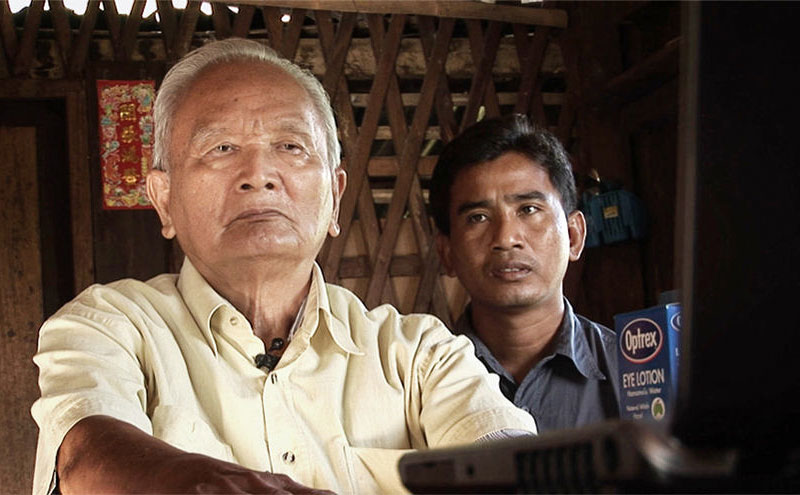In connection with his appeal in August against being jailed for life for crimes against humanity, Nuon Chea is asking the Khmer Rouge tribunal to summon filmmakers Thet Sambath and Rob Lemkin to give evidence, according to a court document made public last week.
The request is connected to what Nuon Chea’s lawyers see as an important line of defense: an argument that the Communist Party of Kampuchea did not exercise iron-clad hierarchical control over regional leaders, who in fact had significant autonomy to carry out purges, killings and other crimes on their own.

Mr. Sambath spent nearly a decade interviewing Nuon Chea before the Khmer Rouge ideologue’s 2007 arrest; along with Mr. Lemkin, he turned the footage into a documentary, “Enemies of the People,” that was released in 2010 and won several awards.
In an interview with Voice of America shortly after the tribunal issued its verdict in August, Mr. Sambath defended Nuon Chea and said he possessed information that would prove he is innocent of some Khmer Rouge crimes, in particular the massacre of Lon Nol soldiers and officials at the Tuol Po Chrey execution site in Pursat province.
“The ones who actually initiated the idea of starving, arresting and killing people at that time are still living freely,” Mr. Sambath said in the interview, which Nuon Chea’s lawyers are seeking to admit as evidence. “That’s why I said that the prosecution of Mr. Nuon Chea and Mr. Khieu Samphan…is unjust.”
“The tribunal needs to find the perpetrators who actually committed the acts in the regime and who even caused Pol Pot and Nuon Chea a major headache. Frankly speaking, I share Nuon Chea’s feeling,” Mr. Sambath said, explaining that he had a nearly telepathic relationship with Nuon Chea. “It is almost like two people sharing exactly the same feeling.”
He went on to claim that potential witnesses he had interviewed were concerned about their safety because they thought the Cambodian government would murder them if they divulged their evidence to the Khmer Rouge tribunal.
The interview led to a strong rebuke from the government. Shortly after it aired, the Council of Ministers released a 45-minute video about the recent verdict in which Mr. Sambath is lambasted by the narrator for appearing to disrespect the court and refusing to turn his footage over to the tribunal’s investigators.
The video was narrated by Dim Sovannarom, the chief of the tribunal’s Public Affairs Section, who is also an official at the Council of Ministers.
Mr. Sovannarom says in the video that Mr. Sambath’s comments were “contrary to the view and the creation of the Khmer Rouge tribunal.”
“I would like to inform Mr. Sambath that in principle, [people] should not criticize the court’s decision or verdict, but instead they have to respect it,” he says.
Mr. Lemkin, a U.K. national, has also come forward claiming to have evidence in favor of Nuon Chea. In 2013, according to another court document, Mr. Lemkin emailed Nuon Chea’s international lawyer, Victor Koppe, and asserted that he and Mr. Sambath had clear evidence that the killings at Tuol Po Chrey were ordered by Northwest Zone Secretary Ruos Nhim to further his own “agenda.”
The two filmmakers announced in 2012 that they were working on a documentary entitled “Suspicious Minds” that would focus on internal factions within the Khmer Rouge. The film’s current status is unclear.
Mr. Sambath has made repeated claims in the media that the Cambodian government is trying to kill him for his work on “Suspicious Minds,” and that he has been led on multiple car chases by agents of the government.
Earlier this year, he told a student newspaper at Harvard University, where he won a “scholars at risk” fellowship for the 2013/14 academic year, that “secret agents” in Cambodia had been pursuing him, forcing him to hide out in the forest and, ultimately, seek shelter in the U.S.
Mr. Sambath could not be reached for comment.
Mr. Lemkin said he was unaware of the request for a summons.
“I have not said anything about inculpation or exculpation as I am not a lawyer,” he added.
Phay Siphan, a spokesman for the Council of Ministers, vehemently denied that the government was trying to kill or intimidate Mr. Sambath or any witnesses.
“The government, we don’t have any intention to kill anyone,” he said. “It’s a baseless accusation.”
“Who is he?” Mr. Siphan added, referring to Mr. Sambath. “He is very important? He runs political issues? Who is he? Even now I don’t know who he is. It’s a joke.”
(Additional reporting by Van Roeun)